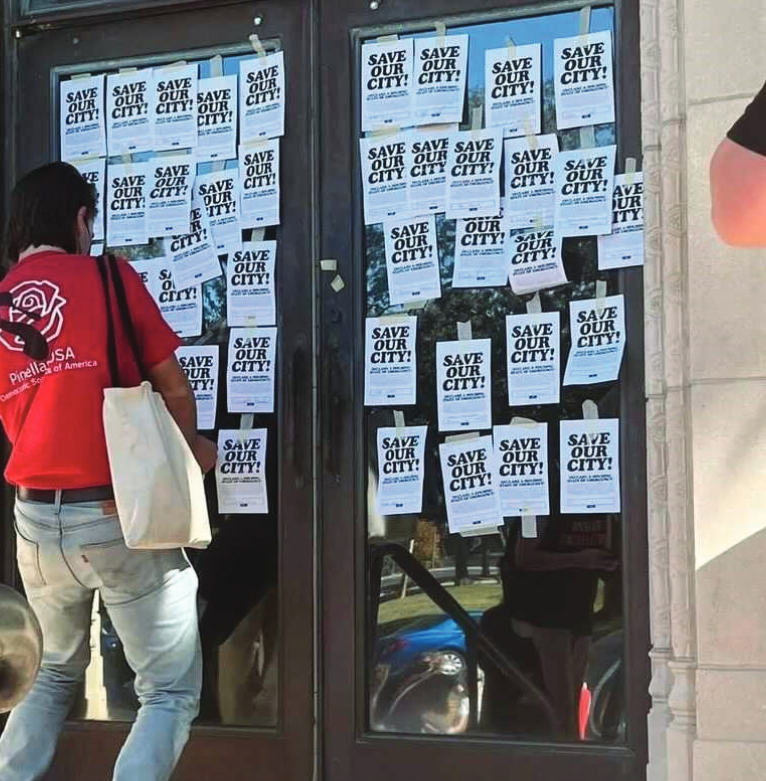Pictured above: A demonstrator posts “Save Our City” flyers on the door of St. Petersburg City Hall.
Courtesy of @peoplescouncilstpete on Instagram
By Jenna Sierra
As the housing market continues to favor the Tampa Bay area as a “hot spot,” many local renters are finding that they must pay the price.
Property values have skyrocketed following the development of luxury housing and the push for gentrification looms over the area.
In 2021, the Tampa Bay Times reported a 24% increase in rent. As values continue to rise, individual landlords and property management companies have continued to reflect this trend by increasing tenants’ rents in Tampa Bay — and especially in St. Petersburg.
Is this a housing crisis? The short answer is yes.
Wages continue to remain stagnant in Florida and have not caught up with the rising rent costs, an unfortunate reality that is exacerbated as the pandemic enters its third year. People are strapped for cash, as budgeting for rent now accounts for the majority of people’s paychecks and the city’s rental assistance program is notoriously inaccessible and inconsistent.
With the recent decision made by the United States Supreme Court in Alabama Association of Realtors v. Department of Health and Human Services, which declared the federal extension of the CDC eviction moratorium “unconstitutional” and favored the real estate industry interests, evictions have continued to occur at an alarming rate.
This led to large waves of evictions nationally and especially in St. Petersburg. The violent effects of evictions are made evident in the tragic death of Kelvin Washington, who fatally collapsed in October of 2020 while attempting to evacuate his apartment after being given less than a month’s notice.
Organizations such as the YIMBY, or the “yes, in my back yard” movement, advocate for an increase in housing development in St. Petersburg. Proponents argue that the increased housing numbers will stabilize the market, allowing rent to naturally become more affordable.
This has proven to be a flawed approach, as our current unregulated housing market has had disastrous consequences in St. Petersburg — leading to our modern crisis, despite a surplus in housing.
The current minimum wage is $10 per hour and won’t reach $15 per hour until 2026. Meanwhile, protections for renters remain fictitious in this housing crisis. There is something we can do — we can and must demand rent control in the city of St. Petersburg.
What is rent control?
Rent control is a legislative measure that allows governments to limit rental price growth rates in a city, state or country.
In Florida, rent control is preempted by the state, with the exception of a declaration of a state of emergency, which can be done by local governments, such as in the case of St. Petersburg.
Rent control has consistently proven itself as a measure that provides community stability, promotes racial equity and welcomes economic opportunity. Many rent-burdened individuals include disabled folks, people of color, elders and those with an intersection of these identities.
Rent control would be a lifeline for these individuals and would allow them to engage with their communities, families and work environments without the threat of homelessness.
Historic racist housing policies, such as redlining and blockbusting, has led to Black neighborhoods with uniquely exploitative landlords that know the city and can easily ignore these predatory practices — leading many to consider leaving historic communities or sell family owned homes as developers continue to seek buying up land in south St. Petersburg.
In an effort to claim this lifeline, community organizers for the St. Petersburg Tenants Union and the Service Employees International Union have spearheaded a proposal to enact rent control in the city.
With public pressure mounting, organizers urge the local government to declare a state of emergency due to the housing crisis and the pandemic, which would allow for a proposed ordinance to be up for election by the people of St. Petersburg.
If passed, the proposed ordinance would prevent rent increases for one year.
As rent rates continue to rise, the proposed ordinance proves to be a necessity for protecting local tenants and preventing the city from losing the very qualities that make it so special.
On Dec. 16, 2021, members of the community gathered in support of rent control. Community organizers, tenants and working people from all backgrounds spoke to the council about the importance of the measure in a city that is becoming more and more inaccessible to its own residents.
St. Petersburg prides itself on the industries that have shaped it into the destination it has become. However, the low income workers who have thanklessly built the city are continuing to be pushed out of their homes.
After hearing the pleas of local residents, City Council voted 6-1 in favor of exploring rent control in 2022, a decision which now falls to the discretion of the newly-elected Mayor Ken Welch.
We have a long road ahead of us in the fight for rent control and in the overarching crusade for guaranteed public housing. This cannot be done by one person, but rather, a group of individuals working toward a common cause.
Housing is a human right and in a city applauded for its progressive values, no one should be on the streets unhoused or forced out of their homes, especially during a pandemic.
Join the movement in fighting for a city for all, not just for the wealthy few.
Jenna Sierra is a senior political science major at the USF St. Petersburg campus.




What a gifted writer !
But of course, the fastest way to destroy a city, other than bombing, is rent control.